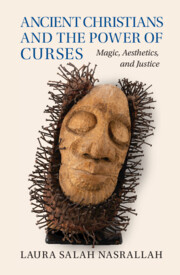Book contents
- Ancient Christians and the Power of Curses
- Ancient Christians and the Power of Curses
- Copyright page
- Dedication
- Contents
- Figures
- Plates
- Preface
- Acknowledgments
- Abbreviations
- Note on the Cover
- Introduction: Curses, Religion, Aesthetics
- 1 Making Justice
- 2 Substance and Story
- Interlude
- 3 Tongues, Breath, Stutter
- 4 Incantation
- Conclusions
- Ancient Sources
- Bibliography
- Index of Ancient Sources
- Index
- Plate Section (PDF Only)
4 - Incantation
Sound and Song as Curse, Cure, and Gospel
Published online by Cambridge University Press: 02 June 2024
- Ancient Christians and the Power of Curses
- Ancient Christians and the Power of Curses
- Copyright page
- Dedication
- Contents
- Figures
- Plates
- Preface
- Acknowledgments
- Abbreviations
- Note on the Cover
- Introduction: Curses, Religion, Aesthetics
- 1 Making Justice
- 2 Substance and Story
- Interlude
- 3 Tongues, Breath, Stutter
- 4 Incantation
- Conclusions
- Ancient Sources
- Bibliography
- Index of Ancient Sources
- Index
- Plate Section (PDF Only)
Summary
Clement of Alexandria’s Protreptikos or Exhortation to the Greeks, written in the late second century, begins with an elaborate story of a song that lures fish, and a cicada that jumps up to fill in for the broken string of a lyre, scraping away with perfect pitch. I have long thought this was odd. The ancient genre of protreptic offered a kind of professional calling card, an introduction to speakers’ cultural sophistication, the strength of their argument and teaching, and a demonstration of their ability to argue for the superior form of philosophy-theology.
- Type
- Chapter
- Information
- Ancient Christians and the Power of CursesMagic, Aesthetics, and Justice, pp. 203 - 260Publisher: Cambridge University PressPrint publication year: 2024

